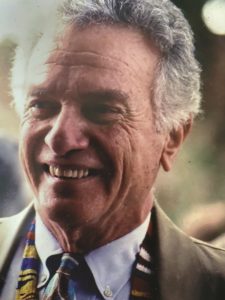When Marshall Smith discovered Truro, many years ago, “He fell in love with the land,” his daughter, Lani, said. “He was enchanted by the kettle ponds and the closeness of the ocean.” She recalls watching her father, a big man, kneeling in the grass to examine “the charming tiny wildflowers,” set off by a backdrop of “infinite shades of green.”
Lani also recalled, with some surprise, that her father “loved grocery shopping.” That, she added, amazed her mother, who “always hated it.”

Marshall Smith died at his home in Cambridge on May 10, 2022. The cause, confirmed by his daughter, was cardiac myopathy. He was 90.
The son of Philip and Ida (Zenis) Smith, Marshall was born on Dec. 13, 1931 in Lynn. He grew up at a challenging time, dominated by the Great Depression in his first decade of life and World War II in his second.
The family moved to Brookline; he attended Brookline High School and at 16 entered Dartmouth College, then earned an M.B.A. at Columbia Business School. He was drafted into the Army and served in post-war Austria for two years.
He and his wife, Judy, cofounded the Paperback Booksmith in Harvard Square in 1961. It grew into a chain of 75 stores during what became the golden age of the paperback business. It was also a socially turbulent time.
In a written tribute, his son Jed quoted Marshall: “Over the decades, the Booksmith was filled with drama, outrage, sadness, excitement, and great changes in the world of civilizations…. We reflected on all of that. We were always socially active, eager to learn and change.”
Marshall defended the right to sell banned books in his stores, but his activism extended far beyond that. He was chair of the board of the American Civil Liberties Union of Massachusetts, an early chair of the Brookline Human Relations Commission, and an elected town meeting member in Brookline.
He also helped create a prison book program and worked to solve food desert inequities in Dorchester. He served as treasurer of Michael Dukakis’s campaign for governor, and he published Judge W. Arthur Garrity’s 1974 ruling that found Boston’s public schools unconstitutionally segregated.
An astute businessman, Marshall was, Lani said, “a very shy person” and a thoughtful man who could spend hours on the dunes of the National Seashore.
In 2007, Marshall bought the long-neglected supermarket on Main Street in Wellfleet from Joe Lema. Though he had never been in the food business before, he took it on more as a community service than as a business, said Lani. It now includes a small book department.
“Marshall was one of the greatest readers of all time,” wrote son Jed. “For decades he would read three or four books at a time. Two weeks before he died, he was proud that he read Moby-Dick, again! ‘It’s 850 pages, you know!’ … On his reading stand today sits a Ken Follett novel open to page 699. Just 103 pages to go.”
“He was an enthusiastic body surfer,” Lani added.
Marshall leaves three children, Lani of Brookline, Greg and wife Nancy of Ashburnham, and Jed and wife Caitlin of Mill Valley, Calif.; a brother, Malcolm, and wife Betty of New York City; grandchildren Sabrina of Jamaica Plain, Philip of Chicago, Sebastian of Ashburnham, and Quinn, Annabel, and Lilah of Mill Valley; nephews Dan of East Montpelier, Vt. and Eric of Eagle River, Alaska; cousins Rita of New Jersey, Susan of Florida, and Marcia; and grandnephews and grandnieces Matt, David, Sijo, Mia, and Lincoln
A memorial will be held at a date to be determined at the Booksmith in Brookline.
Donations in his memory can be made to the ACLU of Massachusetts (www.aclum.org).



